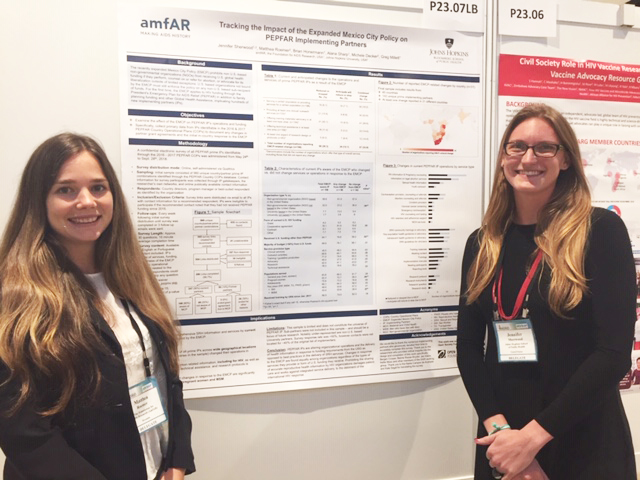At the biennial HIV Research for Prevention (HIVR4P) conference in Madrid, October 21‒25, amfAR Policy Associate Jennifer Sherwood and colleagues presented findings from a survey used to track the impact of the expanded Mexico City Policy on the operations and service delivery of organizations receiving assistance through the U.S. President’s Emergency Plan for AIDS Relief (PEPFAR).

Jennifer Sherwood presents results of survey tracking impacts of expanded Mexico City Policy
The policy, also called the “global gag rule,” prohibits the provision of U.S. global health funding to non-U.S. nongovernmental organizations that advocate, provide, counsel, or refer patients for abortions, even if using their own funds. Due to the unprecedented expansion of the Mexico City Policy, many PEPFAR partners are subject to the policy’s restrictions for the first time, prompting the need to assess where and how the expanded policy may impact service delivery.
“Prohibiting the sharing of accurate reproductive health information by HIV organizations damages patient care and works against integrated service delivery models to the detriment of the international HIV response.” – Jennifer Sherwood, Public Policy Office, amfARAt the HIVR4P conference, which brought together leading researchers, policy makers, and related stakeholders, Sherwood highlighted the amfAR survey in a poster session. This new study builds on her recently published study in BMC Public Health, the results of which were presented at the International AIDS Conference in July 2018.
Sherwood also joined Mitchell Warren and Fatima Riaz, both of AVAC, at a press conference to discuss the most salient study findings. Among “286 organizations operating in 45 countries,” Sherwood said, a significant number reported “stopping or reducing at least one clinical service, outreach service, [or] advocacy activity.” In fact, at least one organization in 31 different countries reported altering its operations or service delivery in response to the policy.
“These changes extend far beyond abortion services,” explained Sherwood, “including reducing or stopping services such as condom provision, emergency contraception, and HIV testing and counseling.”
The results of this survey show that it is not just organizations that do not comply with the policy and lose funding that are impacted, but also current partners that are changing the way they operate in response to the policy. The survey also found that organizations that serve pregnant women and key populations were more likely to report changing their operations in response to the policy.
“These changes often include the suppression of health information,” Sherwood said. “Importantly, these changes are only in response to altered funding requirements from the U.S. government as opposed to new evidence in the field or refinement of best practices in women’s health.”
You can read amfAR’s issue brief on the Mexico City Policy here.
View Infographic: How Expanded Mexico City Policy Is Disrupting Global HIV Programs